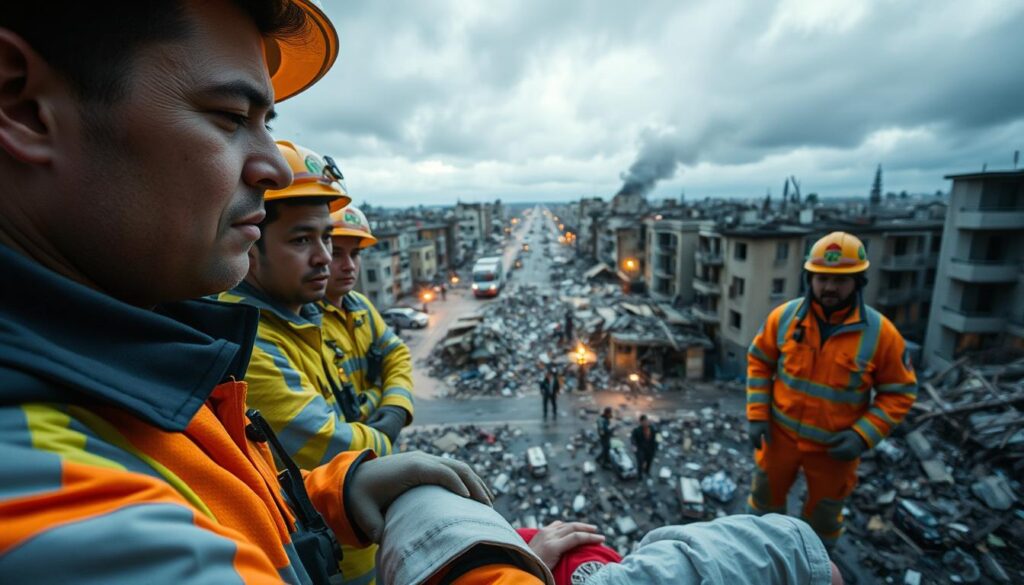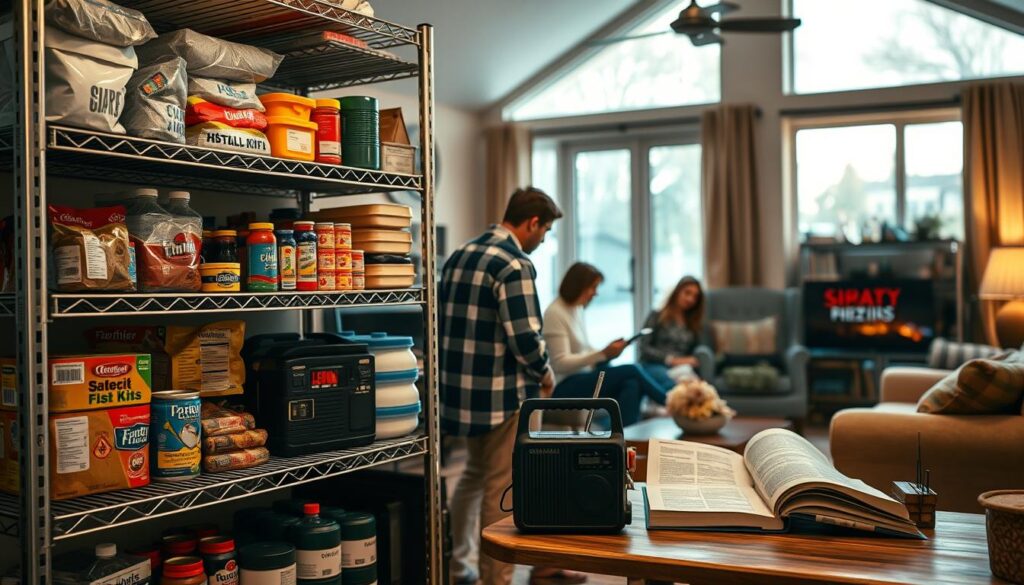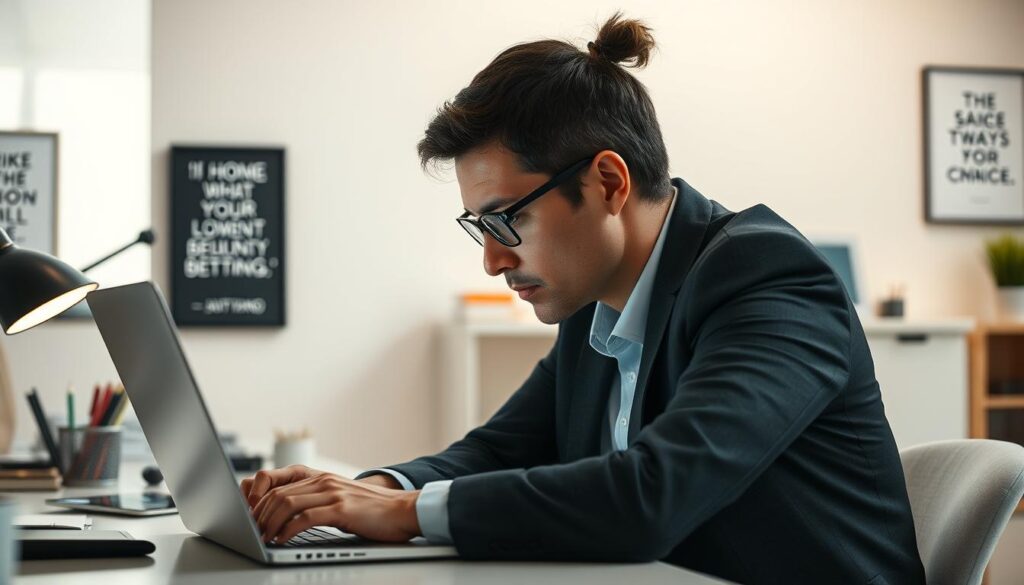Emergencies can happen anytime, leaving us feeling scared and unready. I’ve found that being prepared is the best way to protect my loved ones. Whether it’s a natural disaster, a power outage, or an unexpected event, having a plan is key.
Being ready isn’t just about having the right tools. It’s about feeling secure knowing you’re ready for anything. By preparing for the unexpected, I can keep my family safe and sound.
Key Takeaways
- Understand the importance of having an emergency plan.
- Learn how to prepare for different types of emergencies.
- Discover the essential tools needed for emergency preparedness.
- Find out how to keep your family safe during unexpected events.
- Gain peace of mind by being prepared for emergencies.
Understanding Emergency Response
Knowing how to handle emergencies is key for crisis management. It helps people and groups act fast during crises, reducing damage and helping them get back on track.
Emergency response means taking action right away during or after a disaster. It’s about keeping safe, giving help, and starting to fix things. You need the right skills, tools, and plans, like an emergency response protocol, to do it well.
Definition of Emergency Response
Emergency response is about being ready for sudden events that can harm health, safety, and the environment. It includes things like evacuation plans, first aid, and how to communicate and assess damage.
Importance in Crisis Situations
In crisis times, a good emergency plan can really help. It lessens the crisis’s effects, saves lives, and gets things back to normal faster. By knowing and using good emergency response steps, people and communities can be stronger against disasters and crises.
Good crisis management through emergency response is not just about reacting. It’s also about being ahead of emergencies and lessening their harm. This forward-thinking is essential to reduce the bad effects of crises.
Types of Emergencies I Might Encounter
It’s important to know about different emergencies to make a good emergency plan. These can be natural disasters or medical emergencies. Being ready for these is key for disaster relief and emergency services.
Natural Disasters
Natural disasters like hurricanes, earthquakes, and floods need special preparation. I need a plan with evacuation routes and emergency shelters. Knowing the risks in my area is essential for getting ready.

Medical Emergencies
Medical emergencies, like heart attacks and strokes, need quick action. I should have a first aid kit and know basic first aid. Knowing when to call for help is also important.
Fires and Explosions
Fires and explosions can happen for many reasons, like electrical faults. Having fire extinguishers and practicing drills can lower risks.
Other Crisis Scenarios
Other emergencies, like power outages and chemical spills, need their own plans. Staying informed and having a flexible plan helps me handle many situations.
My Essential Emergency Supplies
To be ready for emergencies, I keep my emergency supplies stocked and ready. This is key for a rapid response to unexpected situations. It helps me avoid risks and stay safe.
Having the right supplies is vital for any emergency action plan. It lets me handle emergencies like natural disasters and medical crises well.
First Aid Kit Essentials
A good first aid kit is essential for my emergency supplies. It should have:
- Bandages and band-aids
- Antiseptic wipes and ointment
- Pain relievers and antihistamines
- Prescription medications and necessary medical equipment
I check and update my first aid kit often. This keeps it useful and effective.
Food and Water Provisions
Having enough food and water is key for survival during emergencies. I stock:
- Non-perishable food items
- Water (at least one gallon per person per day)
- A water purification system or tablets
Communication Tools
Good communication is vital in emergencies. My tools include:
- A battery-powered radio
- A fully charged cell phone with a backup power source
- A two-way radio or walkie-talkie
These tools help me stay informed and talk to family and emergency services.
By keeping these essential supplies, I’m ready for unexpected challenges. This ensures my safety and the safety of those around me.
How I Plan for Emergencies
To stay safe during unexpected events, I make an emergency response plan. This plan is key to ensure my family and I are ready for any situation.
Every household needs a clear emergency plan. It should include safe evacuation routes, meeting points, and important phone numbers.
Creating an Emergency Plan
When making an emergency plan, think about the emergencies you might face. For example, if you live in a hurricane or earthquake area, your plan should cover those situations.
Key parts of an emergency plan are:
- Identifying possible emergency situations
- Setting up evacuation routes and meeting spots
- Choosing a contact person for family to check in with
- Keeping emergency contact info handy

Conducting Risk Assessments
Doing a detailed risk assessment is key to being prepared. It means finding hazards, figuring out their chance and effect, and finding ways to lessen these risks.
| Risk | Likelihood | Impact | Mitigation Measures |
|---|---|---|---|
| Natural Disasters | High | Severe | Have a disaster evacuation plan, stock emergency supplies |
| Medical Emergencies | Medium | High | Keep a first aid kit, know basic first aid |
| Fires | Low | High | Install smoke detectors, have a fire extinguisher |
By making a detailed emergency plan and doing regular risk checks, I can better handle emergencies. This keeps me and those I care about safe.
Training for Emergencies
To handle emergencies well, I know I need good training. This training helps me act right in crisis times. It can save lives and lessen the emergency’s effects.
CPR and First Aid Certification
Getting CPR and first aid certification is key for being ready for emergencies. Knowing basic first aid can really help in emergency situations. I plan to take a first-aid class or watch online tutorials to learn CPR and how to care for wounds.
Emergency Response Drills
Doing emergency response drills often is also vital. These drills let me practice for different scenarios. This way, I can get better at responding to emergencies.
With emergency response training and drills, I can improve my crisis management. This ensures I respond quickly and effectively to emergencies.
Effective Communication During Emergencies
Having a reliable way to communicate can save lives in disasters. I make sure I can stay in touch with family and emergency services. This is key when preparing for emergencies.
Establishing a Communication Plan
A good communication plan is vital for emergency response. I pick a meeting spot outside the house. I also choose a contact person for family to check in with. Everyone in my family has a way to communicate, like a cell phone or two-way radio.
“Communication is key during emergencies,” disaster relief experts say. It’s important to have a plan for different situations. This includes when phones are down or power is out.
Using Technology to Stay Informed
Technology is essential in disaster relief and emergency response. I sign up for emergency alerts from local apps or services. A solar-powered weather radio helps me stay updated when other ways fail.

With a solid communication plan and technology, I’m ready to respond in emergencies.
The Role of Community in Emergency Response
In times of crisis, the community plays a huge role in emergency response. When we work together, we can handle emergencies better.
Forming neighborhood preparedness groups is a key way to do this. These groups help us share resources and info, making us stronger in emergencies.
Neighborhood Preparedness Groups
Working with my neighbors, we can make a plan that helps everyone. This plan includes spotting dangers, setting up a communication system, and doing drills.
- Identify hazards like flood areas or buildings with dangerous materials.
- Set up a network with emergency numbers and a way to alert neighbors.
- Do drills to make sure everyone knows what to do in emergencies.
Collaborating with Local Authorities
Working with local authorities is key to getting ready for emergencies. Together, we can make an emergency action plan that fits our community’s needs.
For more info on disaster prep and response, I can check out Penn State Extension. They offer great advice on emergency services and getting ready as a community.
By joining forces with neighborhood groups and local authorities, we can make sure our community is ready for emergencies. This teamwork not only keeps us safe but also brings us together.
Mental Health Considerations in Emergencies
Emergencies can be very stressful, making it key to think about mental health. When things get tough, how we handle stress and anxiety matters a lot. Knowing how to keep our minds healthy during emergencies is important.
Coping with Stress and Anxiety
Handling stress and anxiety in emergencies needs a plan. Using deep breathing, meditation, and sticking to a routine can really help.
It’s also good to stay updated but not get too caught up in the news. Talking to loved ones can offer a lot of comfort too.
Seeking Support
Looking for help is brave, not weak. In emergencies, talking to mental health experts or joining support groups can be very helpful.
Using community resources, like local teams or online forums, can also be a great way to find support.
| Coping Strategy | Description | Support Resource |
|---|---|---|
| Deep Breathing | Reduces stress and anxiety | Mindfulness Apps |
| Meditation | Promotes relaxation | Local Meditation Groups |
| Routine Maintenance | Provides a sense of normalcy | Emergency Planning Guides |
By focusing on mental health and using good coping methods, we can get through emergencies better. This approach is part of a full emergency response protocol. It prepares us both physically and mentally.
Ongoing Education and Resources
As I keep learning to be ready for emergencies, I see how key it is to keep up with new info. Emergency prep isn’t just a one-time thing. It’s a journey that needs constant learning and updates to stay ready.
To keep up, I regularly check and update my emergency plan and supplies. I make sure my food and water don’t expire, my first aid kit is full, and I know the newest emergency response methods.
Staying Updated on Best Practices
I keep learning by using online resources for emergency preparedness. I visit sites like the Federal Emergency Management Agency (FEMA) for training and tips.
I also join community emergency team trainings. These give me real experience and insights into how to respond in emergencies.
Useful Online Resources
There are many online resources for emergency prep, like FEMA. Websites focus on disaster prep, emergency planning, and building community strength.
These sites offer tools and guides for making your own emergency plans. They also have training and courses for emergency responders.
By using these resources and staying committed to learning, I can make sure I’m always ready for emergencies. This keeps my loved ones safe.
Conclusion: My Commitment to Safety
I know how important it is to be ready for emergencies today. By learning about emergency response and crisis management, I keep my family safe. This helps us stay calm and comfortable when unexpected things happen.
Having a good plan is key to managing crises well. I’ve learned to always have important supplies like a first aid kit and ways to communicate ready. With the right planning and training, I feel ready to face emergencies head-on.
Preparedness in Daily Life
For me, being prepared is more than just for emergencies. It’s a way of life. By staying up-to-date with emergency response tips and taking part in training, I stay ready.
Encouraging Others to Take Action
I want to encourage everyone to prepare for emergencies. When we all do, our community becomes safer and stronger. Let’s all focus on being prepared for emergencies. Together, we can face any challenge that comes our way.
FAQ
What is emergency response, and why is it so important in crisis situations?
Emergency response is the action taken during or right after a disaster. It’s key because knowing what to do can save lives and lessen damage.
What types of emergencies should I be ready for?
Be ready for natural disasters like hurricanes, earthquakes, and floods. Also, prepare for medical emergencies, fires, and other crises like power outages or terrorist attacks.
What are the must-have supplies for emergency preparedness?
You’ll need a first aid kit, enough food and water, and ways to communicate. This includes cell phones, two-way radios, or satellite phones.
How do I plan for emergencies?
Start by making a detailed emergency plan. Do risk assessments to find hazards. Also, create a communication plan so everyone knows what to do.
Why is training important for emergency response?
Training teaches you how to act in emergencies. Getting CPR and first aid certified and doing drills helps you prepare better.
How can I stay informed during an emergency?
Use a communication plan and technology like emergency alerts, social media, and apps. This helps you get updates and stay informed.
What role does the community play in emergency response?
Communities help by forming groups and working with local authorities. This boosts preparedness and response efforts.
How can I cope with stress and anxiety during emergencies?
Recognize stress signs and use techniques to reduce it. Seek help from family, friends, or mental health experts when needed.
Where can I find resources to stay updated on emergency preparedness?
Look online at sites like the American Red Cross and FEMA. They offer tips and advice on getting ready for emergencies.
What is the importance of having an emergency response team?
A response team is vital. It’s made up of trained people who work together to handle emergencies. This helps reduce damage and saves lives.
How often should I review and update my emergency plan?
Update your plan every six months. This keeps it current and effective, considering any changes in your life or community.



